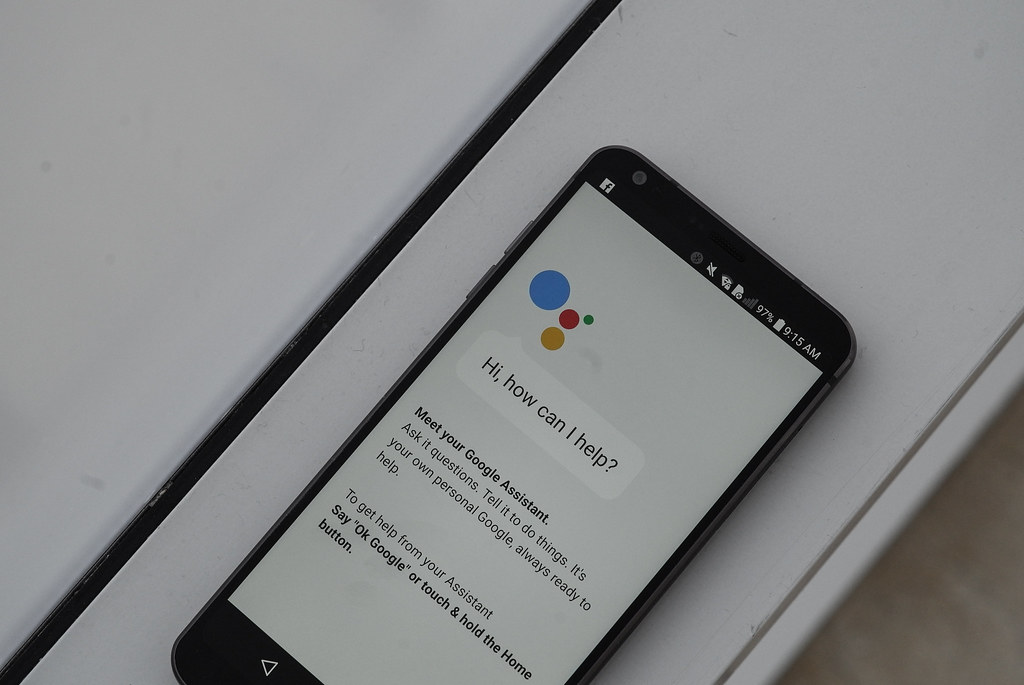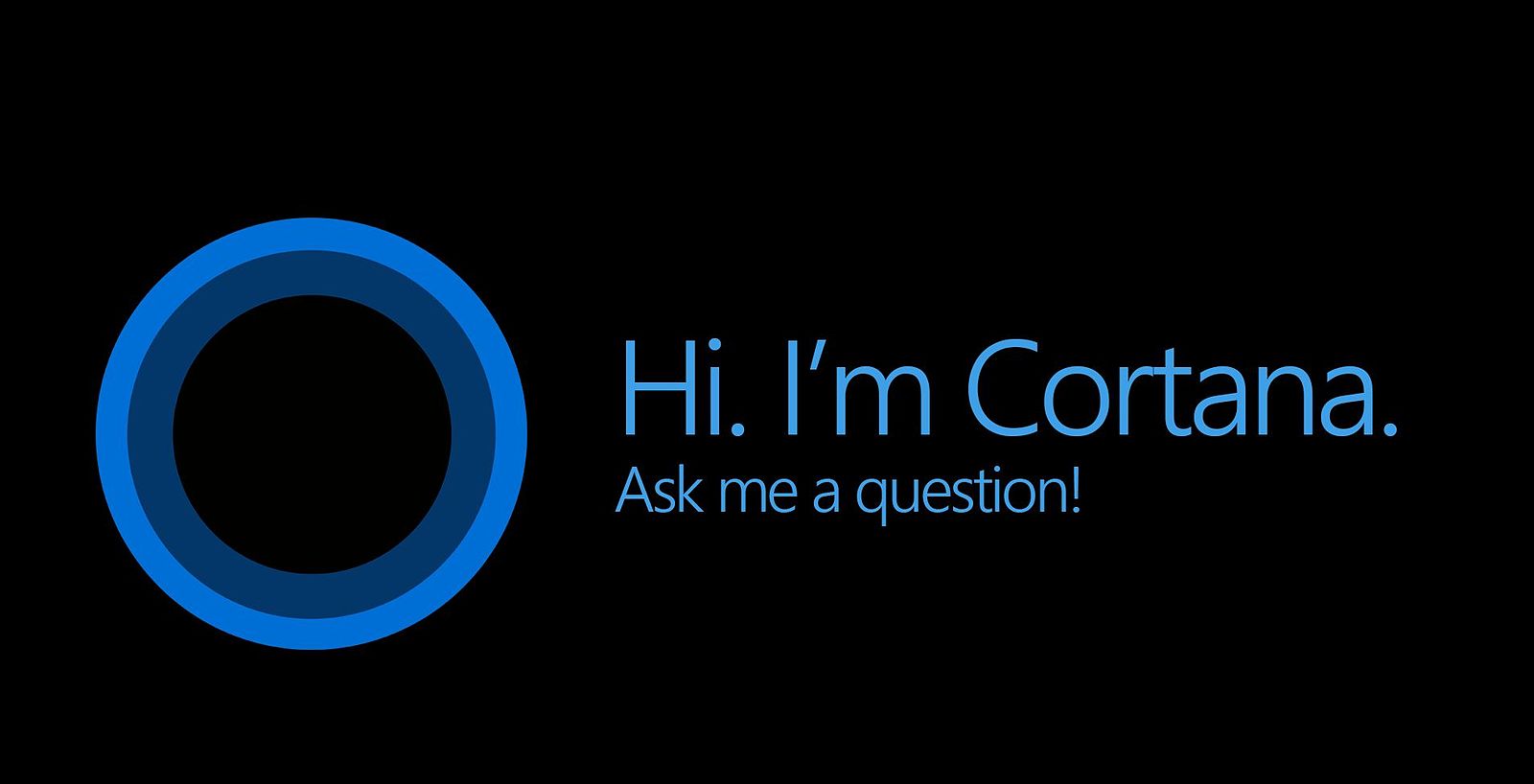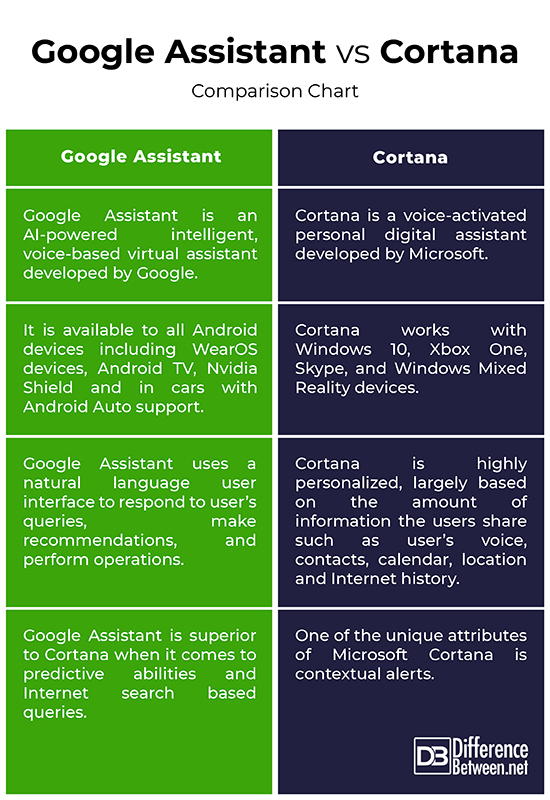Difference Between Google Assistant and Cortana
Virtual assistant is boon for everyone in this digital era. It has paved way for a new technology where we can ask questions and can interact with machines as we humans do with each other. This new technology has attracted the whole world in many ways. Some of the major players in the virtual assistant ecosystem are Google Assistant and Microsoft Cortana. But the question is: should you Ok Google or rather talk to Cortana? Let’s take a look how the two virtual assistants stack up against each other.
What is Google Assistant?
Google Assistant is an AI-powered intelligent virtual assistant developed by Google. It uses the Google’s search function and knowledge base right on your smartphones and Google Home devices. Artificial intelligence becomes an inseparable element of our day-to-day life. Google Assistant uses the power of AI to assist you and to perform operations using your voice. Google introduced its voice-based digital assistant at the Google’s developer conference in 2016 as part of its messaging app Allo and its Google Home smart speaker. Initially, Google Assistant was exclusive to Google Pixel and Pixel XL smartphones but was deployed on other Android devices starting Feb 2017. In April 2017, Google extended the support of Google Assistant to a wide range of devices including smart home devices and in cars. Major car manufacturers have started adopting Android Auto that allows you to get hands-free with your Google Assistant.
What is Cortana?
Cortana is an intelligent, voice-based personal digital assistant created by Microsoft for its Windows powered devices for both PC and mobile. It was first introduced in Windows Phone 8.1 and later integrated with Windows 10 desktop operating systems. It collects personalized data of users such as their contacts, calendar, location, and Internet history to help and provide suggestions. Cortana is powered by the Bing search engine and is designed to pick up learnings from its user over time. It can do all the basic stuff just like the Google Assistant, such as set reminders and alarm, send traffic updates, give recommendations, and recognize natural voice without keyboard input. It notifies you on your PC every time you missed a call and send a reply text for you. Cortana is personalized, largely based on the amount of information users share. Cortana is named after the AI system in Microsoft’s Halo video game.
Difference between Google Assistant and Cortana
Basics
– Google Assistant is the Google’s very own voice-based personal digital assistant that uses the power of AI to assist you and to perform operations using your voice. You can summon Google Assistant using the wake phrase “Ok, Google”. Google introduced its voice-based digital assistant at the Google’s developer conference in 2016 as part of its messaging app Allo and its Google Home smart speaker. Cortana, on the other hand, is an intelligent, voice-based personal digital assistant created by Microsoft for its Windows powered devices for both PC and mobile. It was first introduced in Windows Phone 8.1 and later integrated with Windows 10 desktop operating systems.
Integration
– Google Assistant has a much wider reach when it comes to device integration. Google Assistant is not just limited to its own hardware, but it is also available in a wide range of third-party smart home devices through partnerships with companies. It is available to all Android devices including WearOS devices, Android TV, Nvidia Shield and in cars with Android Auto support. Microsoft Cortana, on the other hand, is mostly limited to the Microsoft ecosystem and it’s deeply integrated with its Edge internet browser. Cortana works with Windows 10, Xbox One, Skype, and Windows Mixed Reality devices.
Features
– Cortana and Google Assistant perform all the basic operations fairly well such as set reminders, send emails and texts, manage your calendar, play music and podcasts, play games, and more. However, Cortana is highly personalized and is largely based on the amount of information the users share such as user’s voice, contacts, calendar, location and Internet browsing history to help and provide suggestions. Google Assistant uses a natural language user interface to respond to user’s queries, make recommendations, and perform operations by delegating requests to a set of services.
Strength
– Cortana is capable enough to compare favorably with its competitors including Google. One of the unique attributes of Cortana include contextual alerts which remind users of a specific thing when they are talking to some specific person. Predictive search is one of the selling points of Cortana. However, Google Assistant is still superior to Cortana when it comes to predictive abilities and it excels in internet search-based queries because of its strong integration with Google’s search technology. Internet search is still the main forte of Google so it gives more natural responses when it comes to search based queries.
Google Assistant vs. Cortana: Comparison Chart
Summary of Google Assistant vs. Cortana
While Cortana is tightly integrated with the Microsoft ecosystem and works great on Windows, Google Assistant seems to be pretty flawless on most platforms, including third-party smart home devices. Google Assistant certainly has the upper hand here as it integrates well some of Google’s other services. Moreover, it is superior to Cortana when it comes to predictive abilities and search based queries. However, Cortana is no behind; it packs enough power to compare favorably with its competitors including Google.
- Difference Between Caucus and Primary - June 18, 2024
- Difference Between PPO and POS - May 30, 2024
- Difference Between RFID and NFC - May 28, 2024
Search DifferenceBetween.net :
Leave a Response
References :
[0]Bhanver, Jagmohan S. Nadella: The Changing the Face of Microsoft. London, United Kingdom: Hachette UK, 2014. Print
[1]Bakshi, Sambit et al. Recent Findings in Intelligent Computing Techniques: Proceedings of the 5th ICACNI 2017, Volume 1. Berlin, Germany: Springer, 2018. Print
[2]Thampi, Sabu M. at al. Advances in Signal Processing and Intelligent Recognition Systems: 4th International Symposium SIRS 2018. Berlin, Germany: Springer, 2019. Print
[3]Image rcedit: https://live.staticflickr.com/3813/33454478855_bab3ec884a_b.jpg
[4]Image credit: https://commons.wikimedia.org/wiki/File:Cortana_(%D0%9A%D0%BE%D1%80%D1%82%D0%B0%D0%BD%D0%B0).jpeg



